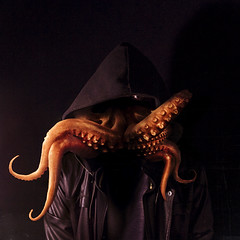 Pop quiz, dear readers: What's the difference between a mixture and a compound? Yeah, I know, you came here for books not basic chemistry, but stick with me. That logophile's authority Merriam-Webster calls a mixture "a combination of different kinds of things," while it dubs a compound "a distinct substance formed by chemical union of two or more ingredients in definite proportion by weight." Remember the difference? In a mixture, the various ingredients retain their properties and can be relatively easily separated; in a compound, the components bond together to make something entirely new that can only be split apart by its destruction. Think of raisin bran, trail mix, and Earth's atmosphere as examples of the former. And for the latter, consider water, salt -- and Charles Stross' wonderful melding of horror, spy thriller, and Lovecraftian horror called The Atrocity Archives.
Pop quiz, dear readers: What's the difference between a mixture and a compound? Yeah, I know, you came here for books not basic chemistry, but stick with me. That logophile's authority Merriam-Webster calls a mixture "a combination of different kinds of things," while it dubs a compound "a distinct substance formed by chemical union of two or more ingredients in definite proportion by weight." Remember the difference? In a mixture, the various ingredients retain their properties and can be relatively easily separated; in a compound, the components bond together to make something entirely new that can only be split apart by its destruction. Think of raisin bran, trail mix, and Earth's atmosphere as examples of the former. And for the latter, consider water, salt -- and Charles Stross' wonderful melding of horror, spy thriller, and Lovecraftian horror called The Atrocity Archives.The question, of course, is why would one call call an ultra-secret U.K. agency (an agency dedicated to warding off eldritch destruction from beyond the bounds of our very universe) the Laundry? I mean, the Americans get to call their analogous organization the Black Chamber, which is ever so much more menacing. Alas, the Laundry owes its moniker to the fact that its original offices once perched over a Chinese laundry. That's bureaucracy for you, and the Crown's most clandestine organization isn't above auditing the number of paperclips in your desk drawer. That drives Laundry computer geek Bob Howard nuts. He knows that all it takes to draw a squamous evil into our plane of existence is the right arithmetic formulae, some arcane geometry, and a little shed blood to collapse the quantum wave. (Seems that magic and math have quite a lot in common.) Any fool with an advanced degree can do it, which is why so many of them get drafted by the Laundry -- including Bob. Well, thanks to some quick thinking in applying a fire extinguisher to the cranium of a possessed coworker, Bob's about to get drafted again, this time into field service. And that field service will involve everything from Middle Eastern occult terrorists to a CCTV network rewired to act as a modern Medusa.
Any speculative fiction author worth his salt can come up with a cornucopia of ideas from the genre's grab bag, and Stross has certainly seized more than his fair share. The first line of The Atrocity Archives is "Green sky at night; hackers delight," and an allusion to the most recognizable line in William Gibson's "Johnny Mnemonic" rounds out the collection. (The book contains a short novel and a novella.) But among the technobabble appears skull-and-dagger spycraft worth of John le Carré and a special forces operation that recalls Tom Clancy. Those tough military types, though, aren't hunting run-of-the mill terrorists; they're after sanity-shredding horrors from beyond the veil of space and time. Throw in some super-advanced math and gadgets reminiscent of William Hope Hodgson's Carnacki, and you've an idea of how The Atrocity Archives reads. Only not really, because it's difficult to convey how smoothly the book unfolds. You'd expect lumps and pacing problems in a title with such diverse influences, but it feels entirely natural when Bob steps through a transdimensional portal in an Amsterdam hotel and lands in an airless alternative earth where Nazi holdouts have carved a portrait of Hitler on the moon. Making that work takes writing chops, and Stross certainly has them. With The Atrocity Archives, he's compounded something all his own.
(Picture: CC 2013 by Ares Nguyen)


2 comments:
The sequels maintain the quality. My particular favorite is "The Jennifer Morgue," which is a little confusing the first time around because it pulls the most graceful concealed about-face, such that it's not till it's over that you realize what it just did.
I'm definitely going to have to read it. The Atrocity Archives is one of the few Lovecraft homages that actually advances his brand of horror rather than simply satirizing it. Also, love the send up of bureaucratic cultures.
Post a Comment